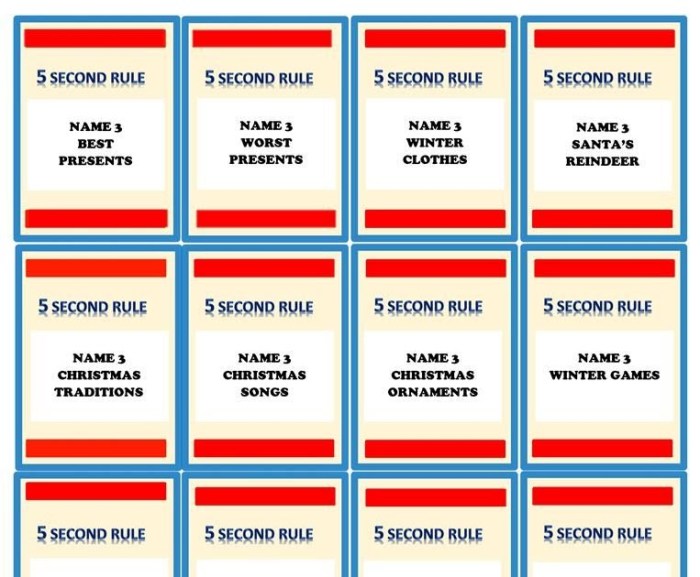Embark on a captivating journey with our comprehensive no sabo game questions PDF. Dive into the intricacies of sabotage in gaming, unraveling its types, ethical implications, preventive strategies, and consequences. This in-depth guide will equip you with the knowledge to navigate the complexities of sabotage and enhance your gaming experience.
From defining sabotage and exploring its impact on gameplay to analyzing real-world case studies, this PDF provides a thorough examination of the phenomenon.
Define “Sabotage” in the context of gaming
Sabotage in gaming refers to deliberate actions taken by a player or team to disrupt the progress or success of another player or team.
Sabotage can take various forms, depending on the specific game mechanics and objectives. Some common examples include:
In multiplayer games
- Blocking or hindering opponents’ movements or attacks.
- Destroying or stealing resources or equipment.
- Intentionally providing false information or misleading guidance.
- Exploiting game mechanics to gain an unfair advantage.
In single-player games
- Destroying or altering game files to disrupt gameplay.
- Using cheat codes or exploits to bypass game challenges.
- Intentionally making poor decisions or performing actions that hinder progress.
Types of Sabotage in Games: No Sabo Game Questions Pdf

Sabotage in games is a deliberate act that hinders or disrupts gameplay. It can take various forms, each with unique consequences.
One common type of sabotage is blocking resources. This involves obstructing access to essential resources, such as power-ups, weapons, or healing items. By preventing players from acquiring these resources, saboteurs can gain an advantage or put their opponents at a disadvantage.
Griefing
Another type of sabotage is griefing. This involves intentionally disrupting the gameplay experience of other players. Griefers may destroy items, kill other players without provocation, or use exploits to gain an unfair advantage. Their goal is to cause frustration and annoyance, rather than to gain any tangible benefit.
Cheating
Cheatingis a form of sabotage that involves using unauthorized methods or tools to gain an unfair advantage. This can include using hacks, exploits, or third-party software to manipulate the game’s mechanics. Cheating undermines the integrity of the game and can ruin the experience for legitimate players.
For those seeking a thrilling gaming experience, no sabo game questions pdf provides a comprehensive guide to navigating the challenges of this popular multiplayer game. But if you’re looking for a different kind of adventure, el escape cubano pdf free offers an immersive historical tale of a daring escape from Cuba.
While no sabo game questions pdf focuses on gameplay strategy, el escape cubano pdf free transports readers to a world of intrigue and danger. And when you’re ready to return to the gaming realm, no sabo game questions pdf will be there to guide you.
Teamkilling
In team-based games, teamkillingoccurs when a player intentionally kills or damages their own teammates. This can be done for various reasons, such as personal grudges, trolling, or strategic advantage. Teamkilling can severely disrupt team coordination and morale.
Ethical Implications of Sabotage
Sabotage in gaming presents ethical considerations that warrant exploration. While it can offer strategic advantages and a sense of accomplishment, it also raises concerns about fairness, competition, and the overall gaming experience.
On the one hand, sabotage can be seen as a legitimate tactic that tests players’ adaptability and resilience. It can also add an element of unpredictability and excitement to gameplay. Moreover, in certain games, such as multiplayer first-person shooters, sabotage may be an essential part of the game’s mechanics.
Potential Benefits
- Strategic advantage: Sabotage can provide players with an advantage over their opponents, enabling them to disrupt strategies and gain the upper hand.
- Increased excitement: Sabotage can introduce unexpected twists and turns, adding an element of thrill and unpredictability to gameplay.
- Skill development: Sabotage can encourage players to develop critical thinking and problem-solving skills as they navigate the challenges it presents.
Potential Drawbacks
- Unfair advantage: Sabotage can create an uneven playing field, especially if it is used excessively or unethically.
- Frustration: Sabotage can be frustrating for players who are targeted, leading to negative emotions and a diminished gaming experience.
- Toxic gameplay: Excessive or malicious sabotage can foster a toxic gaming environment, discouraging fair play and discouraging new players.
Strategies for Preventing Sabotage

Preventing sabotage in games requires a multi-faceted approach that addresses both technical and social aspects. Here are some strategies to consider:
Technical Measures
- Implement strong security measures:Use encryption, firewalls, and intrusion detection systems to protect game servers and client software from unauthorized access and malicious attacks.
- Enforce player authentication and account verification:Verify player identities to prevent impersonation and limit the ability of malicious actors to create multiple accounts for sabotage purposes.
- Use anti-cheat software:Detect and prevent the use of third-party tools or modifications that give players an unfair advantage or allow them to sabotage the game.
- Monitor player behavior:Track player activity for suspicious patterns, such as sudden changes in performance, unusual interactions with other players, or frequent reports of disruptive behavior.
Consequences of Sabotage

Sabotage in games can lead to significant consequences for both individual players and the gaming community as a whole.
For individual players, sabotage can result in:
- Loss of progress or resources
- Increased difficulty in completing challenges
- Frustration and anger
- Reduced enjoyment of the game
For the gaming community, sabotage can:
- Create a toxic and unwelcoming environment
- Discourage new players from joining the community
- Damage the reputation of the game and its developers
Case Studies of Sabotage in Games

Sabotage has been a prevalent issue in the gaming community, leading to severe consequences for both players and developers. Here are some notable case studies that highlight the impact of sabotage in games:
World of Warcraft: The Corrupted Blood Incident, No sabo game questions pdf
In 2005, a player in World of Warcraft unleashed a devastating virus called Corrupted Blood. The virus spread rapidly through the game, infecting and killing countless characters. The incident caused widespread chaos and panic, leading to the temporary shutdown of the game’s servers.
The Corrupted Blood Incident remains one of the most infamous examples of sabotage in gaming history.
Call of Duty: Modern Warfare 2: The Javelin Glitch
In 2009, a glitch in Call of Duty: Modern Warfare 2 allowed players to use the Javelin missile launcher to shoot down enemy aircraft from an unlimited distance. This exploit gave players an unfair advantage and disrupted the game’s balance.
The glitch was eventually patched, but it had a significant impact on the game’s competitive scene.
PlayerUnknown’s Battlegrounds: The Team Killing Problem
PlayerUnknown’s Battlegrounds (PUBG) has faced a persistent problem with team killing, where players intentionally kill their own teammates. This behavior has led to frustration and toxicity within the game’s community. PUBG has implemented measures to combat team killing, but it remains a significant issue.
These case studies demonstrate the negative impact that sabotage can have on games. Sabotage can disrupt gameplay, ruin the experience for players, and damage the reputation of developers. It is important to take steps to prevent sabotage and ensure that games remain fair and enjoyable for all.
FAQ Explained
What is the most common type of sabotage in games?
Griefing, which involves intentionally disrupting other players’ gameplay, is a prevalent form of sabotage.
How can I prevent sabotage in online games?
Utilizing anti-cheat software, reporting suspicious behavior, and promoting a positive gaming culture can help deter sabotage.
What are the ethical implications of using sabotage in games?
Sabotage can compromise fair play, damage the gaming community, and potentially lead to real-world consequences.